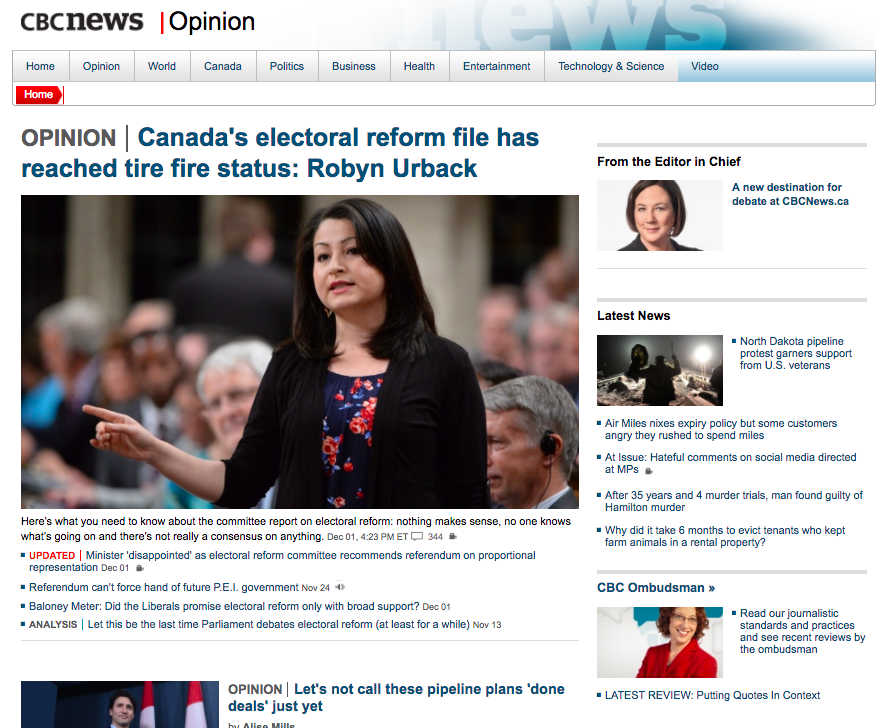Furor over CBC’s opinion section is a tempest in an inkpot
Hard news alone cannot fulfill the CBC’s mandate. Opinions can help do that.
By Romayne Smith Fullerton, Ethics Editor
The CBC’s decision to offer a separate section on its news website dedicated to opinion columns, and the enormous amount of ‘ink’ spilled in protest, show what a tempest in an inkpot this issue is.
If you’re a regular CBC listener or viewer, you know that the Mother Corp has been purveying commentary for ages: think Rex Murphy (decidedly right) on Cross Country Check-up, or Michael Enright (decidedly left) on Sunday Edition, or any number of panel discussions (politically mixed) offered regularly as part of The National.
I’d also point out that the biggest political commentary to which the CBC ever gave a platform was Coach’s Corner with Don Cherry. While the talk ostensibly was about hockey, Cherry’s right wing views were always front and centre, whether he was pointing out the inadequacy of the laws to deal with violent offenders, or offering tributes to members of our military.
Few seemed to care about this and even fewer batted an eye at the exorbitant salary (rumoured to be about $800k) he was reportedly making, despite being paid from public funds.
Apparently, the difference now is that CBC is offering these opinions in writing rather than broadcasting them orally. Last week, representatives of both the Globe and Mail as well as Rebel Media appeared before a Commons committee to ask that the government intercede on their behalf because CBC digital is cutting into their market share.
Oh come on.
As Andrew Coyne argued recently, in our capitalist, global economy, there will always be someone or something to blame for a flagging bottom line. The CBC is only the latest and easiest target.
Part of the CBC’s mandate is to offer a “wide range of programming that informs, enlightens, and entertains” and among other things, the offerings should “contribute to shared national consciousness and identity.”
In order that Canadians know each other, and understand the thoughts, attitudes, and values of others across our vast country, we need to expose ourselves to a range of interpretations and opinions.
Hard news stories alone simply cannot answer this directive.
People now consume their information in short sharp bursts and they likely benefit from reading opinions. Columnists offer easy access to wide-ranging information without the effort of time-consuming research. You could call this a lazy practice but, on the other hand, analysis and commentary provoke people to examine their own feelings and responses in order that they themselves can better articulate their perspectives on public issues, and exercise their obligations as citizens in a democracy.
As the National Post’s Dave Berry put it, “we need the media to find and report on stories that are capable of changing how we see the world: stories that undermine the official narrative, that bring to light something that would rather be kept dark, that try to understand the world as it actually is, not just as we’d like it to be” .
But Berry is concerned the CBC is spreading its money too thin and he would prefer it devote its budget to straight reporting, and just stick with the facts. Opinion is too expensive.
Behind Coyne’s and Berry’s and others’ puff and bluster is concern about money, taxpayers money and consumer dollars. When the CBC was created, there wasn’t the mecca of media choice that currently exists to afford consumers choices. And audiences can exercise their discretion by voting with their wallets, the argument goes.
Along with media scholar Robert Picard , I don’t believe there ever was a “Golden Age” of journalism when most people engaged regularly with serious news coverage or commentary. Or more importantly, when audiences were willing to pay for this. But at present, competition among media outlets for eyeballs is tighter than ever.
Add to this that neoliberal attitudes have shaped our personalities and permeated our thinking about the obligations of the market to our democracy. Point of clarity: there are none.
The merger of opinion and news among mainstream for- profit outlets is more than ever driven by audience desires rather than audience needs.
It’s news tailored to the prurient, the sensational, and the most entertaining. It’s information that satisfies our most base desires, but does nothing to create better understanding among community members, or help us solve our differences and build better communities. This at a time when social divisions not clearly articulated or even brought to light by much mainstream media have driven our southern neighbours to a breaking point.
In an age when clickbait rules, serious commentary from a publicly-funded entity is not a bad alternative In fact, we could think of it as needed infrastructure, just like roads and schools. And it’s expected: Generation Next simply assumes commentary is part of the news diet, hardly worth remarking on, never mind getting in a froth over it.
This week, I took an informal poll of about 140 senior undergraduates in a class titled, “Information and the Public Sphere” that I teach at the University of Western Ontario. I asked whether they knew that the CBC now had a separate spot on its website for opinion and commentary.
Not a single hand went up.
Several students did note, as if to compensate for this lack of knowledge, that the site has a separate section for Indigenous news. So it’s not that they weren’t paying attention to the news, or to CBC news in particular, contrary to common assumptions about the 18-30 demographic. They just didn’t see the CBC’s move to offer commentary separately as all that noteworthy.
When I pointed out this “change,” no one said the foregrounding of different sections for news and opinion as something bad.
They gave it the big shrug. As for the tempest in the inkwell, it seems the sense of “crisis” is mainly among media types: practicing journalists with a vested interest, or media analysts and commentators, or academics, who find all things CBC “fascinating fodder.”
The general public appears to have a different take. I had a look at the numerous (presumably Canadian) posts responding to Jennifer McGuire’s online explanation for this new section.
The short version is, our pundits are out of touch with what most people think. Many applauded what they see as a clear separation of news reporting and opinion. This echoes a 2012 Pew Center study that found that, as much as Americans revel in opinion pieces, almost 70% still prefer their news to have no particular point of view.
In the words of Jim Graham, “When I was growing up, we could always look forward to finding editorials on the Editorial page, not the front page.”
“In recent years, broadcasters and journalists have worked hard at editorializing every story infusing their personal opinion and tone into supposedly factual accounts,” Graham continued. “If this is a move to reinstate that historic and ethical divide, I am all for it.”
Correction, Dec. 2, 2016: A previous version of this story referred to Sunday Edition as Sunday Morning. We apologize for the error.




